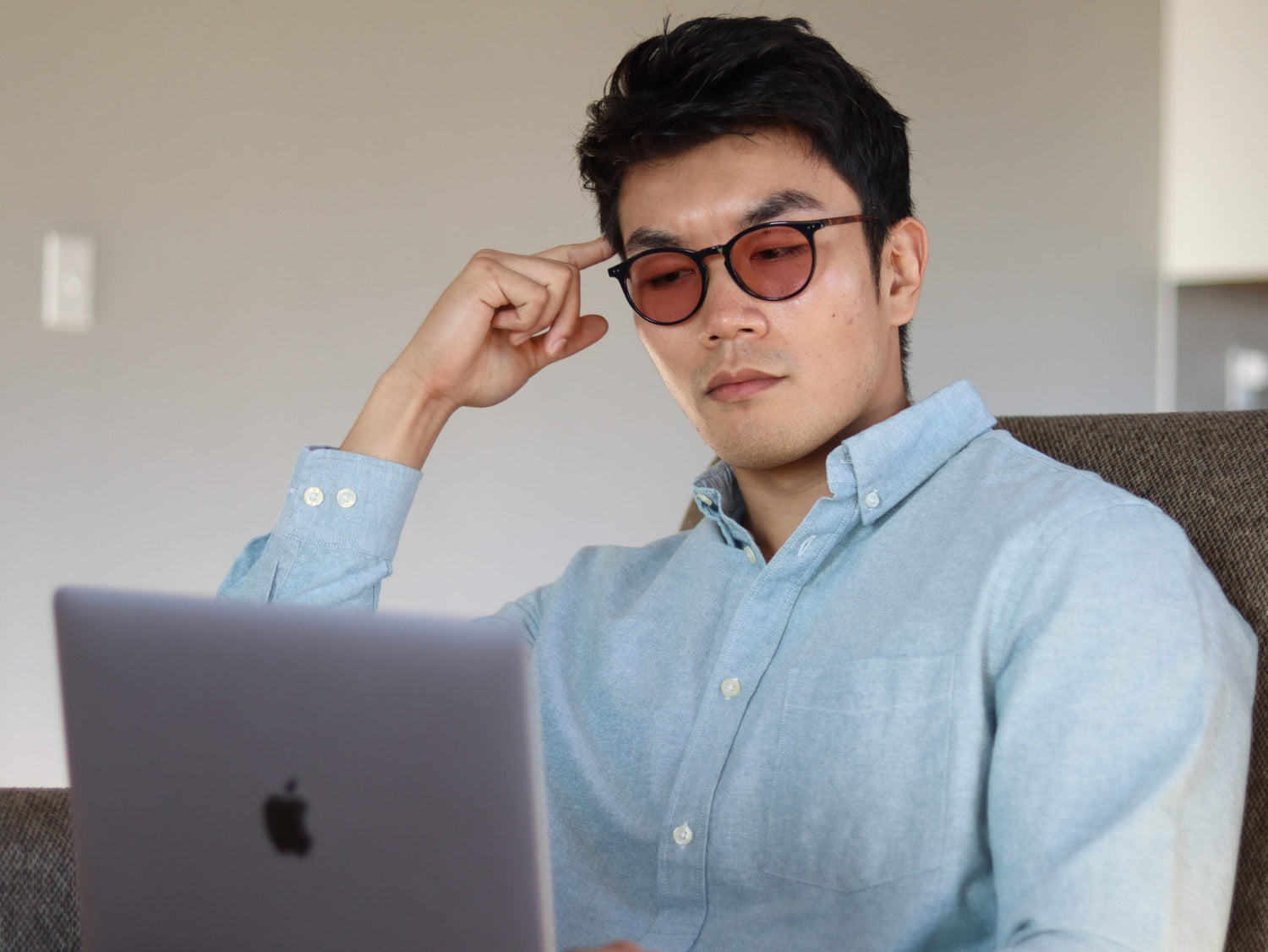Blue light glasses are well known among people who suffer from regular migraine and headaches, especially for those who have already identified blue light as a trigger.
But there is a lot of information out there that could be confusing.
In this article, we’ll discuss what you should know about blue light exposure, what type of glasses to look for, and why you might want to think twice about buying "blue light glasses" for your migraines. New research suggests they may not even be effective for eye strain.
We’ll start with a personal story that might feel familiar for many migraine sufferers.
“My job’s lighting was really affecting my vision and my overall being,” says Cory from Florida. “I was leaving work with migraines and had become so extremely sensitive to light that I would come home and lie in the dark.”
If you're like Cory and your eyes bother you after working on your computer, watching TV, or staring at a smartphone, it could be digital eye strain related to the blue light exposure from electronic LED screens. This light is also known to adversely affect your ability to sleep (nearly 80 percent of Americans report using digital devices within an hour of heading for bed).

“Blue blockers” or blue light glasses are purported to alleviate bothersome symptoms of blue light exposure. While the have become pretty popular, there are two things you should know. First, blue blockers are NOT the answer for people with migraine disease and light sensitivity. Second, research released in February 2021 indicates that blue blocking glasses might not have any effect at all for any symptoms of eye strain.
If you’ve been looking into blue light glasses as a potential help for migraine, consider Christina’s experience. She’s been dealing with migraines for 40 years, and her profession requires long 12 hour days primarily at a computer.
“Despite numerous
Christina’s story continues later in this article. But does her situation sound familiar? Do long days in front of a computer screen cause discomfort in your eyes by the end of the day? Maybe you even get headaches or migraines after a day like that.
Whether you’re a migraine sufferer or not, you should know what blue light blocking glasses can and cannot do. We’ve already said that blue blockers aren’t the answer for migraines and sensitivity to light, but let’s talk about why.
What You Should Know About Harmful Blue Light
The biggest source of blue light in our lives is actually the sun, but the sun also emits the full spectrum of light to balance things out. The long-term effects of exposure to artificial sources of blue light is where most of the concern about blue light comes from, especially since these light sources tend to be excessive, unbalanced, and closer to the eye.
Artificial sources of blue light include:
- Fluorescent lighting (common in retail stores, offices, and some homes)
- Compact fluorescent (CFL) light bulbs
- Flat screen LED TVs
- LED lighting
- Smartphones and tablets
- Computer monitors

Unfortunately, the human eye isn’t good at blocking blue light on its own. Because of this, nearly all of the visible blue light passes through your cornea, reaching the retina. Over time, continued exposure to blue light could lead to damage to the retinal cells, and may be related to conditions like age-related macular degeneration, eye cancers, and cataracts. It is also well known that blue light exposure too close to bedtime can have a detrimental effect on sleep because of disruptions in your body’s melatonin production.
According to the Vision Council, “about 80 percent of American adults report using digital devices for more than two hours per day with nearly 67 percent using two or more devices simultaneously, and 59 percent report experiencing symptoms of digital eye strain.” Those symptoms may include:
- Dry eyes
- Headaches
- Blurred vision
- Neck and shoulder pain
Because it’s short-wavelength and high-energy, blue light scatters easily, making your eyes work harder to see contrast. We also tend to blink less frequently while using these blue light emitting devices. All these factors contribute to eye strain, which may lead to headaches, dry eyes, and blurred vision.
If you’re already prone to migraines, this means blue light exposure could be a migraine trigger for you.
What to Do About Blue Light
If blue light triggers or aggravates your migraine disease or if you’re simply sensitive to it, taking frequent breaks can help. Many experts recommend using the 20-20-20 rule. That is, every 20 minutes, look 20 feet away for 20 seconds. You can also try getting up for a stretch or a quick walk to give your eyes a break. And hey, you could probably use a drink or a snack anyway, so when the urge hits you, give in (it could help with eye strain, but maybe not your waistline).

For many years, blue light blocking glasses have also been thought to help with headaches, eye strain, dryness, and blurred vision. However, newly published research suggests that they actually aren’t effective at reducing headaches and other symptoms related to digital eye strain.
Do Blue Light Glasses Work? What the Research Says
A study recently published in the American Journal of Ophthalmology tested 120 computer users with symptoms related to blue light exposure. They were given a 2-hour computer task, and received either blue-blocking eyeglasses or clear (placebo) glasses to wear during that time. All participants were led to believe they had received blue blockers.
After the 2-hour task, there was no difference in participants’ eye strain symptom score between those who wore real blue blocking glasses and those who received the placebo. In short, blue light blocking glasses were not proven to be any better for eye strain than regular clear lenses. Unfortunately, this means that they won’t help with eye-strain-related headaches.
It should be noted that this study was conducted on blue blockers only — not on migraine and light sensitivity glasses. And as you’re about to see, there is a big difference between blue blockers and bonafide lenses designed to help people with migraine and light sensitivity.
The Difference Between Blue Light Blocking Glasses & Migraine Glasses
Not all blue light is the same, just like not all glasses purported to help with light sensitivity are the same.
Blue light blocking glasses are designed to block blue-violet light, and block mostly the violet. Of course, their actual effect on eye strain and other symptoms is unproven, according to the research cited above.
What migraine sufferers need to understand is that wavelengths of light that typically trigger migraines aren’t violet, but blue, amber, and red. So while “blue blocking glasses” are supposed to reduce eye strain, they are simply not designed to block the light that's actually the most uncomfortable.

If you’re already light-sensitive and prone to migraines, then Axon Optics with Avulux® lenses for migraine & light sensitivity are for you. They’re precisely engineered and clinically proven. They're made specifically for people with migraine and light sensitivity. In fact, many studies have shown their effectiveness in blocking the specific wavelengths that aggravate light sensitivity and migraine.
Remember Christina and her 12-hour days in front of a computer screen? Well, after trying many filters, Christina tried Axon Optics:
“My glasses have been a lifesaver. My eye pressure and strain has completely resolved. Why did I ever wait to make the purchase?”
Cory had a similar experience after trying both blue light glasses and Axon Optics.
“I purchased these after first trying a pair of blue light glasses (thinking they would work but they didn’t) and I couldn’t be happier! These glasses saved me! I can’t go to work without them.”
In short, the effect blue blocking glasses are designed for digital eye strain, but their efficacy is definitely in question. Axon Optics migraine glasses with Avulux lenses are the only clinically proven lenses that filter up to 97% of harmful blue, amber, and red light while allowing soothing green light through.
Dr. Bradley J. Katz, neuro-ophthalmologist at the University of Utah explains, “The reason why most blue blocking glasses aren’t very effective for migraineurs is that they simply don’t block the wavelengths of light that activate the pain-sensitive cells in your eye. Those cells are activated by light at about 480 nanometers, and most blue blocking lenses only come down to about 450 nanometers, so they’re just not designed to help with that discomfort.”
The figures below illustrate what Dr. Katz is talking about, and can help you see the difference between the light spectrums filtered by traditional blue blockers, and how Axon Optics with Avulux lenses work. These lenses are much more than a fashionable lens coating. They’re specifically designed to filter out the offending light, and that requires some precise engineering.

You should also know that being bothered by blue light wavelengths doesn’t necessarily mean you have photophobia. But if you're sensitive to light, you’re likely to benefit from these precision-tinted lenses, which are specifically designed for light-sensitive people.
For Harmful Blue Light and Migraines, Try Precision-Tinted Migraine Glasses
If you're light-sensitive, Axon Optics with Avulux precision-tinted lenses are made for you — blocking up to 97% of the specific types of harmful light. They also come with a 60-day guarantee. Try them and see how they can help you manage your life with migraine and light sensitivity.
What has been your experience trying blue light or migraine glasses? Have any questions? Feel free to comment below — we’re eager to hear from you.
“Relief At Last”
"I have tried different glasses ordered from the internet to help block out blue light which caused significant eye pain. They would all help to some degree but not for long, and I would often end up with a migraine! These glasses from Axon Optics work great!" -Nickie
References
Thevisioncouncil.org. (2020). Digital Eye Strain | The Vision Council.
Harvard Health. (2020). Blue light has a dark side – Harvard Health.
UC Davis Health. (2019). Is Blue Light From Your TV, Cell Phone Bad for Your Health?
American Journal of Ophthalmology. (2021). Do blue-blocking lenses reduce eye strain from extended screen time? A double-masked, randomized controlled trial.






